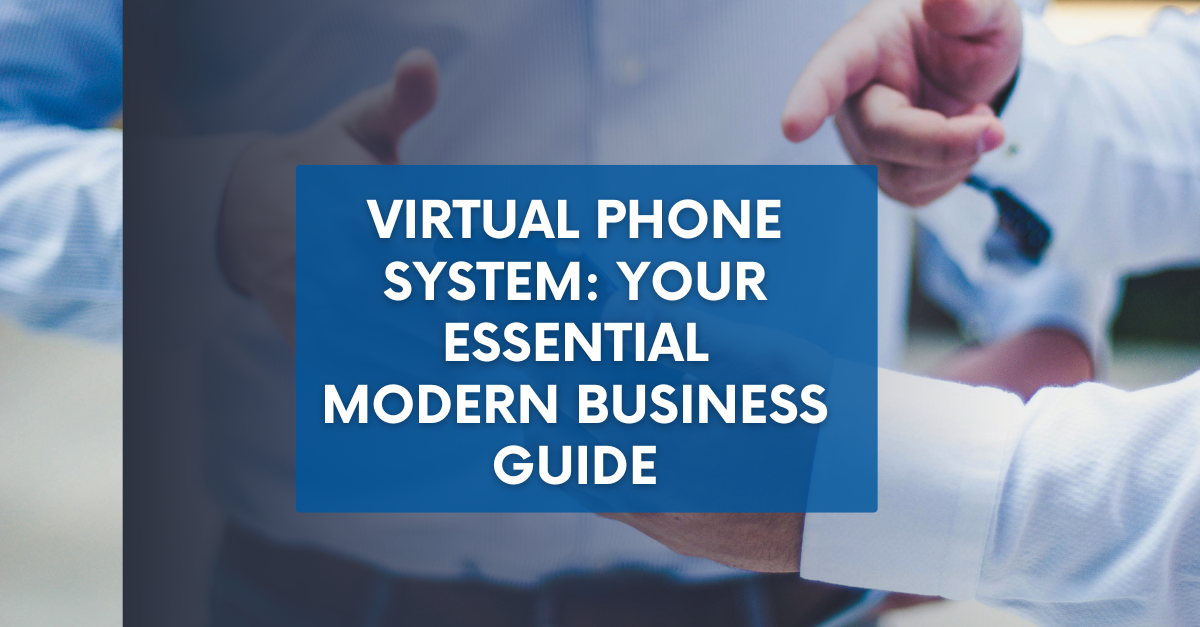In today’s fast-paced business environment, effective communication is the cornerstone of success. Whether you’re a small startup or a large enterprise, staying connected with customers, clients, and team members is essential for growth and productivity. This is where virtual phone systems come into play, offering a modern solution to traditional communication challenges.
In this comprehensive guide, we’ll delve into the world of virtual phone systems, explaining what they are, how they work, and why your business can benefit from using one. Whether you’re a solopreneur working from home or a growing startup with a distributed team, understanding virtual phone systems is crucial for enhancing your communication capabilities and projecting a professional image to your customers. Let’s get started!
A. Brief Overview of Virtual Phone Systems
Virtual phone systems, also known as cloud-based or VoIP (Voice over Internet Protocol) phone systems, are a type of communication technology that allows businesses to make and receive phone calls over the internet. Unlike traditional phone systems that rely on physical hardware, virtual phone systems operate through software that can be accessed from any device with an internet connection.
B. Importance of Communication for Businesses
Communication is the lifeblood of any business. It facilitates collaboration, builds relationships with customers, and enables seamless operations. In today’s digital age, businesses need to adopt modern communication tools to keep up with the evolving landscape and meet the expectations of their customers.
C. Purpose of the Blog Post
The purpose of this blog post is to provide a comprehensive overview of virtual phone systems, including how they work, their benefits, and who can benefit from them. Whether you’re considering upgrading your current phone system or looking for ways to improve your business communication, this guide will help you understand the basics of virtual phone systems and make an informed decision for your business.

II. What are Virtual Phone Systems?
A. Definition and Explanation
Virtual phone systems, also known as cloud-based or VoIP phone systems, are communication solutions that enable businesses to make and receive phone calls over the internet. Unlike traditional phone systems that rely on physical phone lines and hardware, virtual phone systems operate using software that is hosted in the cloud. This means that businesses can access their phone system from anywhere with an internet connection, making communication more flexible and efficient.
B. Key Features and Functionalities
Virtual phone systems offer a wide range of features and functionalities designed to enhance communication and streamline business operations. Some of the key features include:
- Auto-attendant: Virtual phone systems can greet callers and direct them to the appropriate department or extension using automated menus. Also known as virtual attendant.
- Enhanced Voicemail: Users can receive and manage voicemail messages directly from their virtual phone system, receive it via email and have it automatically transcribed.
- Call forwarding: Calls can be forwarded to mobile phones or other devices, ensuring that businesses never miss an important call.
- Conference calling: Virtual phone systems support conference calls with multiple participants, making it easy for teams to collaborate remotely.
- Call recording: Calls can be recorded for quality assurance, training purposes, or legal compliance.
- Integration: Virtual phone systems can integrate with other business tools and software, such as CRM systems, to streamline workflows and improve productivity.
C. Types of Virtual Phone Systems
There are several types of virtual phone systems available, each offering unique features and benefits. The most common types include:
- Cloud-based: Cloud-based virtual phone systems are hosted in the cloud, eliminating the need for on-premise hardware. This makes them highly scalable and cost-effective.
- VoIP: VoIP (Voice over Internet Protocol) virtual phone systems use internet protocol to transmit voice calls, allowing businesses to make calls over the internet rather than traditional phone lines. VoIP systems are known for their cost savings and flexibility.
- Traditional PBX: Some virtual phone systems use traditional PBX (Private Branch Exchange) technology, which connects internal phone lines to the public switched telephone network (PSTN). While less common than cloud-based and VoIP systems, traditional PBX systems are still used by some businesses for their reliability and familiarity.
In the next section, we’ll explore how virtual phone systems work and how they can benefit businesses of all sizes.
III. How do Virtual Phone Systems Work?
A. Overview of the Technology
Virtual phone systems leverage internet protocol (IP) technology to facilitate communication over the internet. Instead of using traditional phone lines, virtual phone systems convert voice signals into digital data packets that are transmitted over the internet. This allows for more efficient and cost-effective communication compared to traditional phone systems.
B. Step-by-Step Process of Making and Receiving Calls
- Initiating a Call: When a user initiates a call, the virtual phone system uses VoIP technology to convert the voice signal into digital data packets.
- Routing the Call: The virtual phone system routes the call through the internet to the recipient’s phone number.
- Receiving the Call: On the recipient’s end, the digital data packets are converted back into a voice signal, allowing the recipient to hear the caller.
- Call Management: Virtual phone systems offer various call management features, such as call forwarding, voicemail, and call recording, to enhance the user experience.
C. Integration with Existing Devices and Software
Virtual phone systems can be integrated with existing devices, such as smartphones, desktop computers, and IP phones, to provide a seamless communication experience. Additionally, virtual phone systems often offer integration with other business tools and software, such as CRM systems and email platforms, to streamline workflows and improve productivity.
Overall, virtual phone systems offer a modern and flexible communication solution for businesses of all sizes, allowing them to communicate more effectively and efficiently in today’s digital world.

IV. Benefits of Virtual Phone Systems
Virtual phone systems offer a range of benefits for businesses looking to improve their communication capabilities and streamline operations. Here are some key advantages of using a virtual phone system:
A. Cost-effectiveness Compared to Traditional Phone Systems
One of the primary benefits of virtual phone systems is their cost-effectiveness. Unlike traditional phone systems that require expensive hardware and maintenance, virtual phone systems operate using software that is hosted in the cloud. This eliminates the need for costly infrastructure investments and allows businesses to pay for only the features and services they need.
B. Flexibility and Scalability for Growing Businesses
Virtual phone systems are highly flexible and scalable, making them ideal for growing businesses. They can easily adapt to changing business needs and accommodate an increasing number of users and phone lines without the need for additional hardware. This flexibility allows businesses to scale their communication infrastructure as they grow, without incurring significant costs.
C. Enhanced Communication Features (Voicemail, Call Forwarding, etc.)
Virtual phone systems offer a wide range of communication features that can enhance productivity and efficiency. These features include voicemail, call forwarding, auto-attendant, conference calling, and more. By leveraging these features, businesses can improve their communication processes and provide better service to their customers.
D. Professional Image and Customer Service Improvement
Virtual phone systems can help businesses project a professional image and improve customer service. Features such as auto-attendant and call routing can create a seamless and professional experience for callers, regardless of the size of the business. Additionally, virtual phone systems offer advanced call management features, such as call recording and monitoring, that can help businesses improve their customer service and training processes.
V. Who Can Benefit from Virtual Phone Systems?
Virtual phone systems offer a wide range of benefits that make them suitable for businesses of all sizes and industries. Here are some key groups that can benefit from using a virtual phone system:
A. Small Businesses and Startups
Small businesses and startups can benefit greatly from virtual phone systems. These systems offer cost-effective communication solutions that are easy to set up and scale as the business grows. Virtual phone systems also offer features such as auto-attendant and call forwarding, which can help small businesses project a professional image and improve customer service
B. Remote and Distributed Teams
Virtual phone systems are ideal for remote and distributed teams that need to stay connected regardless of their physical location. These systems allow team members to make and receive calls from anywhere with an internet connection, making it easier for remote teams to collaborate and communicate effectively.
C. Freelancers and Solopreneurs
Freelancers and solopreneurs can benefit from virtual phone systems by providing them with a professional communication solution that can help them project a professional image to clients and customers. Virtual phone systems also offer features such as voicemail and call forwarding, which can help freelancers and solopreneurs manage their calls more efficiently.
D. Industries that Rely Heavily on Customer Communication (e.g., Customer Service, Sales)
Industries that rely heavily on customer communication, such as customer service and sales, can benefit from virtual phone systems. These systems offer features such as call recording and monitoring, which can help businesses improve their customer service processes and train their sales teams more effectively. Additionally, virtual phone systems can help businesses manage high call volumes more efficiently, ensuring that customers receive timely and professional service.
VI. How to Choose the Right Virtual Phone System for Your Business
Selecting the right virtual phone system for your business requires careful consideration of several key factors. Here’s a guide to help you make an informed decision:
A. Factors to Consider
- Budget: Determine your budget for the virtual phone system, including any setup costs, monthly fees, and additional features you may need. Compare pricing plans from different providers to find one that fits your budget.
- Features: Identify the features that are essential for your business, such as call forwarding, voicemail, auto-attendant, and conference calling. Look for a virtual phone system that offers the features you need to support your business operations.
- Scalability: Consider the scalability of the virtual phone system. Choose a system that can easily grow with your business and accommodate an increasing number of users and phone lines.
- Integration: Determine if the virtual phone system can integrate with other business tools and software, such as CRM systems and email platforms. Integration can streamline workflows and improve productivity.
- Reliability: Look for a virtual phone system that offers reliable service with minimal downtime. Check customer reviews and testimonials to gauge the reliability of the provider.
- Support: Consider the level of customer support offered by the virtual phone system provider. Choose a provider that offers responsive customer support to address any issues or concerns.
B. Popular Virtual Phone System Providers
- RingCentral: RingCentral is a popular choice for virtual phone systems, offering a wide range of features and scalability options. They are known for their reliable service and excellent customer support.
- Wondercomm: Wondercomm is a virtual phone system designed for small businesses and entrepreneurs. They offer an extensive feature set such as virtual extensions, voicemail transcription, and call forwarding. They are known for their excellent customer service.
- Vonage: Vonage offers a cloud-based phone system that is suitable for businesses of all sizes. They offer features such as mobile apps, virtual receptionists, and conference calling.
C. Case Studies or Testimonials
Consider reading case studies or testimonials from businesses that have successfully implemented virtual phone systems. This can provide valuable insights into the benefits and challenges of using a virtual phone system and help you make an informed decision for your business.
Conclusion
In conclusion, virtual phone systems offer a range of benefits for businesses looking to improve their communication capabilities and streamline operations. From cost-effectiveness and scalability to enhanced communication features and professional image projection, virtual phone systems have revolutionized the way businesses communicate.
Throughout this guide, we’ve explored the basics of virtual phone systems, including how they work, their key features, and the types of businesses that can benefit from them. We’ve also discussed how to choose the right virtual phone system for your business, considering factors such as budget, features, and scalability.
As you consider adopting a virtual phone system for your business, we encourage you to carefully evaluate your communication needs and explore different providers to find one that meets your requirements. Virtual phone systems offer a modern and flexible communication solution that can help your business stay connected and competitive in today’s digital world.
Looking ahead, the future of communication technology is bright, with continued advancements in virtual phone systems and other digital communication tools. By embracing these technologies, businesses can improve their communication processes, enhance customer service, and drive growth and innovation.
We hope this guide has been helpful in understanding the benefits of virtual phone systems and how they can transform the way you communicate. If you have any questions or would like to learn more about virtual phone systems, please feel free to reach out.





Leave a reply